As farmers begin drying off cows, on many spring-calving dairy farms, there are a few things that should be taken into consideration to prevent any new mastitis infections in the herd this coming spring.
Housing conditions have a particular influence on this – as cows are more exposed to mastitis causing bacteria – whilst inside – which can enter the cow’s udder via the teat end.
The following are some top tips to reduce the risk of new mastitis infections, in your herd, in spring 2020.
1. Cleanliness
The cleaner the housing facilities are kept, the cleaner the cow’s udder will be and so, the less likely bacteria will enter at the teat ends.
Keep cubicles, passageways and yards clean. Cleaning them twice-a-day (TAD) will ensure this. If automatic scrapers are in place, make sure they are set on automatic and preferably, run them after cubicles are cleaned down.
If using straw-bedded housing, make sure that the straw is kept refreshed and don’t allow it to become very contaminated with dung. Bedding daily will ensure this and keep it fresh each day.
2. Keep dry
Wet and damp areas are ideal conditions for bacteria to grow, so ensuring that housing facilities are kept dry is essential.
The liming of cubicles is also key to keeping them dry and preventing infections. Cubicles should be regularly cleaned and limed. TAD is advisable.
The same goes for bedded sheds. You should be able to go down on your knees, stand up again and go straight to the disco.
3. Cow comfort
Finally, and probably the most important aspect of housing animals, is cow comfort.
Each cow should have a cubicle to lie in and a place to feed. Placed on top of the cubicle should be a cubicle mat.
A lack of cubicles – or space for all animals in a shed – can lead to udders and teats becoming contaminated with faeces causing an increased risk of infection.
Moreover, overstocked sheds can put stress on an animal, lead to bulling, cause a decrease in production and decreased intakes – due to a lack of feed space.
Also, putting stress on animals – due to overstocking – can cause a decreased immunity resulting in increased infections.

